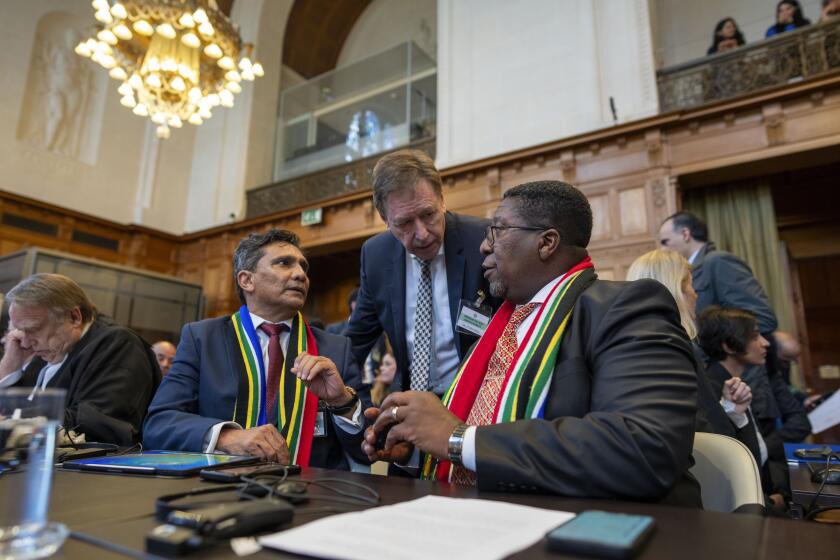Torture Claimed in Case of Alleged Trafficker : Courts: 29 Bolivians say the DEA and soldiers used brutal tactics to get information on Jorge Roca Suarez. Prosecutors say the allegations have been trumped up.
In an extraordinary and bitterly disputed set of sworn declarations, 29 Bolivian citizens claim that U.S. Drug Enforcement Administration agents and Bolivian soldiers went on a rampage of kidnap, torture, rape and intimidation in an effort to build a case against alleged drug kingpin Jorge Roca Suarez.
The alleged atrocities--which American authorities vehemently deny--spanned from 1989 to 1992, according to Bolivians who say they were victimized. Many of those who have completed declarations say soldiers and U.S. agents used the brutal tactics in an attempt to extract information about Roca.
Prosecutors allege that Roca, indicted in 1990, ran one of Bolivia’s largest cocaine cartels, supplying Colombian drug traffickers with the paste needed to make cocaine. They also accuse him and members of his family of laundering millions of dollars in drug proceeds and of evading American taxes.
“Sirs, I have watched on television what happened to Rodney King, the black man, in Los Angeles, and I would like to tell you that these officers did the same thing to me, but worse,” said Carmelo Dominguez Vaca, one of the alleged victims. Dominguez, a Bolivian prison inmate, said he was beaten and tortured for hours, suffering two broken ribs, a lost molar and a dislocated spine.
The declarations, some of which corroborate one another, were filed recently in Los Angeles federal court. Roca’s lawyers are demanding that the charges against their client be dropped.
But prosecutors say the allegations have been trumped up, and in any case are irrelevant to the question of Roca’s guilt. They also question the credibility of the witnesses, noting that several sworn statements come from prison inmates, while others were made by people alleged to be Roca’s drug-trafficking co-conspirators.
U.S. District Judge Stephen V. Wilson has ordered both sides to appear for a hearing early next month on the charges.
Members of Roca’s defense team spent months gathering declarations in Bolivia, and the sworn statements tell stories alleging the use of electrical shocks, as well as beatings with sticks and rifle butts. One man says pliers were used to pull out his toenail, and others say that their heads were forced underwater until they believed they would drown.
In one case, Carlos Hugo Balcazar says agents and soldiers put his head beneath a truck tire and rolled the vehicle slowly back and forth, tearing the skin on his cheek while they pressed guns into his back and face.
The government’s response to the allegations, which probably will be filed next week, is expected to be two-pronged: that the allegations are untrue and that, even if they were true, they would have no bearing on the charges facing Roca.
On the first point, U.S. officials say the people who have filed declarations are lying, some because they have ties to Roca or hope to have their prison sentences reduced; others for unknown reasons.
“You can get any statement, any document, anything you want out of Bolivia,” said one U.S. official who asked not to be identified. “You can get people down there to say whatever you want them to.”
That official and others say the government has interviewed some of the witnesses whose declarations have been provided by the defense lawyers. In some cases, the witnesses’ stories have changed, officials said.
“The government anticipates filing supplemental declarations of certain declarants who have recanted either part or all of their original declarations,” said Assistant U.S. Atty. John F. Gibbons, lead prosecutor in the case.
But prosecutors also maintain that even if the alleged atrocities did occur, there is no evidence that they compromised Roca’s case. That, they say, is because none of the Bolivians who claim they have been mistreated has provided evidence against Roca that will be introduced during the trial.
“Nowhere in his moving papers does or can defendant Roca claim that the indictment against him resulted from any item of evidence seized from him or any witness whose testimony was suspect,” the government states in one brief, filed in San Diego when a portion of the case was being argued there. If atrocities did occur, they must be prosecuted in Bolivia, officials said.
Defense lawyers respond that the torture and abuse were so rampant and shocking that they have interfered with Roca’s ability to defend himself. Many people who claim to have been tortured were potential defense witnesses, Roca’s lawyer said, and news of the atrocities has spread, making other potential witnesses reluctant to come forward.
“As a result of DEA’s actions in Bolivia, Mr. Roca can no longer have a fair trial,” lawyer Yolanda Barrera said in her motion seeking to dismiss the case. “Defense witnesses are now more difficult, if not impossible, to find. All of them fear for themselves and their families.”
One alleged victim, Maria Amelia Sauceto Cabianco, said she was grabbed off the street in Santa Cruz, Bolivia, on Aug. 4, 1991. She said she was blindfolded and taken to a house where she was interrogated, tortured and sexually abused.
“The worst part for me were the sexual abuses and tortures,” Sauceto states in her declaration. “When I remember them, I almost prefer that they killed me.”
At one point, the mother of five says, her captors attached electrical wires to the skin over her ovaries and administered excruciating shocks. Sauceto says she then was raped.
“The ones who raped me first were three American DEA agents, among them Mike and Denny, who I was able to recognize by their voices,” she reports in her declaration. A total of six men raped her, she said, adding: “I heard one of the Americans say that this is what they had done in Vietnam.”
Two other women gave accounts of DEA agents and Bolivian soldiers who frequented a bar called The Blue Crow and raped women there.
In addition to the allegations of torture and abuse, one set of declarations accuses the DEA of illegally obtaining documents that could help prove Roca’s innocence, in particular one that allegedly shows Roca received $1.5 million from his mother, not from the sale of drugs.
Roca’s lawyers say that document is now missing, and they argue that it could help clear their client.
According to lawyer Rodolfo Vicente Galdo-Coca, a DEA informant started a relationship with the daughter of Roca’s Bolivian lawyer, Juan Carlos Camacho Romero. Galdo said that informant then purchased legal documents from Maysa Camacho.
“In my opinion, through the relationship between this informant and . . . Maysa Camacho, DEA had knowledge of most of the important documents, private as well as public, regarding the case of Jorge Roca,” Galdo says in his declaration.
Galdo and another lawyer also say Juan Camacho, who was wanted on drug charges, met frequently with DEA agents and may have turned over confidential documents in hopes of being treated leniently by American authorities.
U.S. authorities acknowledge that DEA agents met with Camacho, but they tell a far different story. They say that Camacho set up the meetings in an effort to pick up information about the DEA’s investigations of himself and Roca. They also maintain that agents never compromised the defense strategy.
A March 11, 1991, letter from a federal prosecutor to American authorities in Bolivia appears to back up the government’s version. The letter gives instructions to a DEA agent on how to handle the planned meeting with Camacho.
“It is imperative that you not ask and Camacho not volunteer any information that deals with current defense strategy,” the letter warns. “Make it clear to Camacho that you will not discuss and cannot be informed as to any legitimate requests of him by Roca’s California attorneys, or any attorney-client conversations or defense strategy.”
Roca is being held without bail at the Federal Detention Center in downtown Los Angeles, where he has been housed for nearly two years. If Roca’s attorneys fail to persuade the judge that the charges against their client should be dropped, his trial is scheduled to begin in December.
More to Read
Start your day right
Sign up for Essential California for news, features and recommendations from the L.A. Times and beyond in your inbox six days a week.
You may occasionally receive promotional content from the Los Angeles Times.







